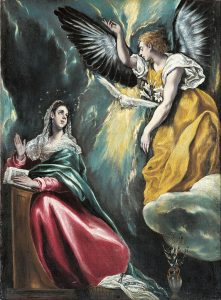Thoughts on Sunday’s Lessons for Dec. 19, 2021
First Reading: Micah 5:2-5a
God’s liberating preference for the poor and the oppressed is made manifest in Sunday’s readings. This may seem to be an unusual theme for the last week in Advent, with Christmas drawing near.

The Annunciation (c.1590-1603), oil painting on canvas by El Greco (1541-1614). Ohara Museum of Art, Kurashiki, Japan. (Click image to enlarge.)
In reality, though, it is a deeply significant message for the impending birth of Jesus: Jesus will go on to care for the poor, the hungry, the ill and imprisoned and oppressed as the central focus of his good news. Our readings begin with Micah, one of the earliest Old Testament prophets. In previous verses, Micah has warned the people of Jerusalem that their injustices against the weak and the poor will bring down God’s wrath. Now we hear the prophet foretell that a new ruler is to come from Bethlehem – the birthplace of King David – to reunite Israel’s remnant as a shepherd leads his flock, under God’s protection in peace.
Psalm: Canticle 15 (Luke 1:46b-55)
Mary’s song of praise, The Magnificat, may either be sung as a psalm this Sunday, or it may be read as the second portion of Sunday’s Gospel. In this beloved song as told by Luke, the pregnant Mary sings grateful praise for God. She rejoices in all that God has done for her. She celebrates the powerful yet merciful God who loves us and calls us to acts of mercy and justice. God has brought down the powerful from their thrones and lifted up the lowly, she sings. God has filled the hungry with good things and sent the rich away empty. God’s justice is restorative – God will take from those who have much and give to those who have none.
Alternate Psalm: Psalm 80:1-7
We sing the first seven of Psalm 80’s nineteen verses on Sunday. The Psalm was probably either written during a time of exile and destruction or recalls that time. The place names invoked in the second verse suggest that this hymn recalls the loss of the Northern Kingdom, Israel, to the Assyrians in 722 BCE. In tones of sorrow, the Psalmist calls on Israel’s God to come and help, to restore the people who, in a memorable metaphor, have been fed with the bread of tears and given tears to drink. Although the people have suffered derision, laughter and scorn from their enemies, including their own neighbors, the Psalm expresses confidence that the light of God’s own countenance can save them.
Second Reading: Hebrews 10:5-10
The Letter to the Hebrews, modern biblical scholars say, was probably written late in the first century, after the Temple was destroyed. At that time, early Christianity was separating from rabbinical Judaism amid anger and pain on both sides. Because Christianity was suffering persecution at the hands of Rome, many Jewish converts to Christianity were returning to the safer confines of Judaism. Much of Hebrews seems intended to reach backsliding Jewish Christians by comparing Judaism unfavorably to Christianity. Sunday’s reading declares that that God abolished the “empty” sacrifices of the Jewish Temple, replacing them and sanctifying us once and for all with Jesus’ sacrifice on the cross. We would do well to discard this view of Judaism as “abolished,” hearing instead the hopeful message that God’s promise to Israel at Sinai continues for us too.
Gospel: Luke 1:39-45
This lovely short reading from Luke’s Gospel comes immediately before the Magnificat, the Song of Mary, which we heard earlier. Here we are told of Mary’s visit to her much older cousin Elizabeth. Both women are pregnant – Elizabeth with John, Mary with Jesus – and both conceived in miraculous ways, visited by angels with the news that they would give birth. When the women meet, Elizabeth feels her child leap in her womb with what she perceives as joy. Suddenly filled with the Holy Spirit, Elizabeth declares Mary blessed among women. “Why has this happened to me,” Elizabeth wonders in amazement, “that the mother of my Lord comes to me?” Then, in the following verses, Mary responds with the Magnificat.
